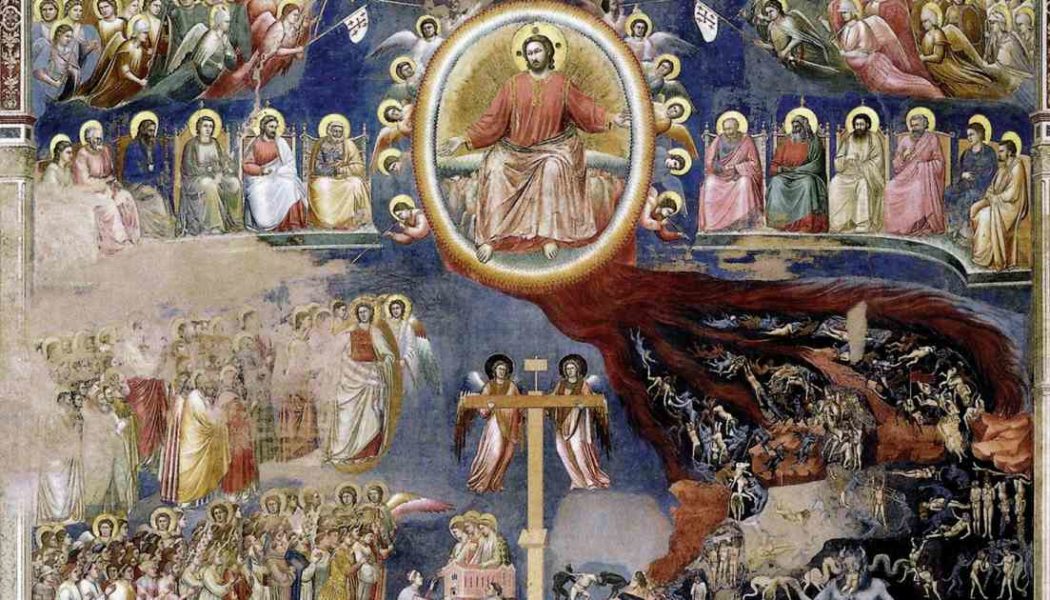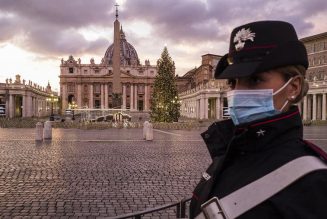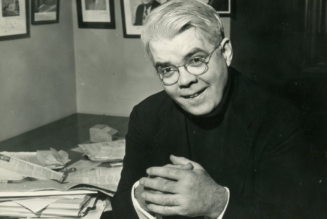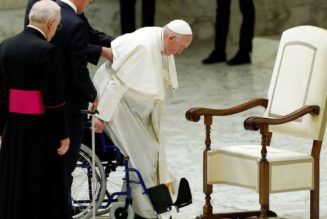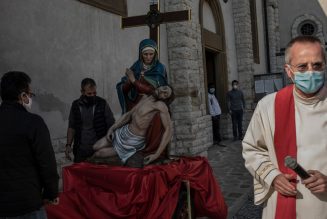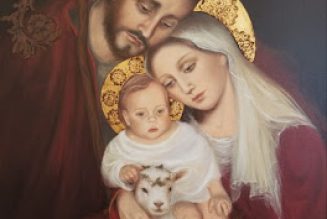
Jesus closes out the Church year by reminding us how he will close out our lives on The Solemnity of Our Lord Jesus Christ, King of the Universe, Year A.
Once again this Sunday, the Church gives us two views of our Last Judgment: St. Paul’s and Our Lord’s. They are not two different realities, but two visions of the same reality.
Jesus’s tale about the end of our days is not really a parable — it’s more of a metaphor.
Jesus says: “When the Son of Man comes in his glory, and all the angels with him, he will sit upon his glorious throne and all the nations will be assembled before him. And he will separate them one from another, as a shepherd separates the sheep from the goats.”
Will he be on a literal throne? Maybe. Or maybe it’s an analogy like the sheep and goats, and what it really means is that his majesty and universal sovereignty will be obvious at last. The word “All” is important in his description of his coming to judge us. “All the nations” means no one will escape his judgment, and “all the angels with him” means that the heavens will be opened — the veil between this world and the next will be dropped. We will see the “enchanted” world for what it has always been, a host of angels — and we will see Jesus, and each other, and our lives, as they truly are.
All of which means that a kind of veil is currently preventing us from seeing things as they are. Why is that? Because our sins have clouded our vision and misdirected our gaze.
The first two readings describe this veil of sin.
Like Jesus, the Prophet Ezekiel calls our divine judge a shepherd in the First Reading. “As a shepherd tends his flock when he finds himself among his scattered sheep, so will I tend my sheep,” writes Ezekiel. “I will rescue them from every place where they were scattered when it was cloudy and dark.”
St. Augustine explains that we have been scattered in darkness — in “rain and fog, the errors of the world; a great darkness arising from human lusts, a thick fog covering the earth. It is difficult for the sheep not to go astray in this fog.”
Because we choose to live our life apart from Jesus, we human beings lose sight of him. But he doesn’t lose site of his beloved flock. “He seeks them, his piercing gaze penetrates the fog, the thick darkness of the clouds does not prevent him,” St. Augustine says.
When Jesus comes again, the mist will lift, and we will be fixed in God’s gaze, as he looks into our hearts.
St. Paul says on that day he will subject even death to himself and “God will be all in all” or, in another translation, “everything to everyone.”
Jesus has been trying to tell us for weeks what we will see when the veil drops.
A month ago he said the “greatest and first commandment” is to love the Lord, your God, with everything in you. The second greatest commandment “is like it”: “You shall love your neighbor as yourself” — because every woman, child, and man you meet is made in God’s image and likeness.
He explained that, like virgins waiting for the groom, we need to prepare now to enter in to the Lord’s presence later. The way we prepare is by living our lives such that we are the light that dispels the darkness, by following his two commandments. Each of us will do this in his own way, assessing the talents God gives us and putting them at risk for the greatest return possible.
Now comes Christ the King Sunday when Jesus gets very specific about what kind of light he expects, and what kind of investment.
Mother Teresa condensed this Sunday’s long Gospel to her “Gospel on five fingers,” counting out with her hand: “You did it to me.” Whatever you did or didn’t do for the hungry and thirsty, the stranger and the vulnerable, the sick and the imprisoned, he says, “You did it to me.”
St. Augustine explains that what we give to the poor, we give to Christ. He imagines Jesus saying, “If you gave anything to my members, what you gave would reach their Head. Would that you had known that my little ones were in need when I placed them on earth for you and appointed them your stewards to bring your good works into my treasury. But you have placed nothing in their hands; therefore you have found nothing in my presence.”
When you die, Jesus won’t ask: “Did you feel heartfelt concern about humanity?” He will ask, “What did you do for this old man, that lonely child, and this single mother?” He won’t ask: “Were you good to your friends and family?” He will ask: “Were you good to my friends and my family, the ‘strangers’ I sent to receive your help?” In the end, his burning question won’t be: “What does the Catechism teach about my mercy?” It will be “What did your actions teach about my mercy?”
We call our failures “sins of omission”; he calls them, “neglecting the Lord in his need.” We tend to feel guilty about bad things we did; he will see our guilt in the good things we were supposed to do but never did.
So, put it all together: Love God and others; plan it out like the wise virgins; and invest your talents today.
What talents do you have?
Some are better suited for the spiritual works of mercy: Instructing, advising, consoling, comforting, admonishing the sinner, forgiving and bearing wrongs patiently. These are natural teachers, thoughtful writers, loving confidantes, life coaches, and compassionate peacemakers offering up their discomfort without complaint. If you have those qualities, your job is to prepare wisely. You will need to think with the mind of Christ, through study and contemplation, to instruct others more effectively and advise them more prudently.
If this is you, unite with Christ in his encounter with the Samaritan woman and his interactions with the Rich Young Man and Zacchaeus. Learn from him to console and comfort people you don’t naturally like. Ask him to share his listening skills, his broad vision and his deep patience.
Others are better suited for the corporal works of mercy: feeding the hungry, sheltering the homeless, clothing the naked, bringing drink to the thirsty, visiting the sick and imprisoned, and burying the dead. These are the organizers, the mobilizers of resources, those who are “doers of the word and not hearers only.” If this is you, then you have to unite with Mary at the visitation and with Jesus as he tours the land healing and nourishing. You need to be willing to serve people who don’t deserve it, accept people you deem unacceptable, and give what you feel you can’t part with.
No matter which is your gift — spiritual works of mercy or corporal works of mercy or, most likely, plenty of both — you need the great soul of magnanimity and the burning heart of charity and the eyes of Christ that look past sins to see the person.
The only place to get that is by uniting with God who is love; praying insistently, daily, confidently.
The bottom line is that we can’t love without God, and we can’t live with God if we don’t love.
In the end, Jesus will “destroy every sovereignty and every authority and power. For he must reign until he has put all his enemies under his feet.”
It’s important to ask: What enemies will be under Christ’s feet? Sinners? Non-Christians? Apostates? None of those. The enemies that will be banished in the end are selfishness, sin and death: The way of Satan that we choose over the Way of Love.
The only way out is Christ, and the only opportunity we have to take that path is now.
Image: Last Judgment, Giotto
